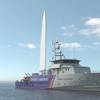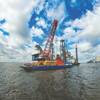Bio-Marine Fuel Refinery Planned for Denmark
The Port of Frederikshavn, Steeper Energy and Aalborg University have partnered to establish what they claim is the world’s first biomass-based plant in Denmark to produce a sustainable sulphur-free marine fuel that will serve over 100,000 vessels passing through the port annually.
The Danish Minister for Trade and European Affairs Nick Hækkerup welcomes the new partnership: “This is a great example of a public-private partnership with a huge potential both for the environment and for business and job creation. I am very satisfied that a Canadian company like Steeper taps into the strong Danish bioenergy cluster and cooperates with Aalborg University on the development of new sustainable energy solutions. Infrastructure is highly prioritized in Denmark and the Port of Frederikshavn will be the perfect setting for the planned production plant.”
Based on our research plant at Aalborg University and on-going project activities of Steeper Energy to establish a pilot-scale plant in Alberta, Canada, the technical challenges and risk involved in a full scale commercial plant in Frederikshavn are significantly reduced,” says Lasse Rosendahl, Professor at Aalborg University, Department of Energy Technology.
According to CEO at the Port of Frederikshavn, Mikkel Seedorf Sørensen, the port could potentially serve an annual marine fuel market of at least 900,000 tons. “This will not only be significant for the future customers to the sustainable marine fuel, but will also create jobs and bring more traffic into the port,” says Mikkel Sørensen. The new fuel will be a drop-in fuel, mixing into what is already in the tanks.
The size of the plant is initially set at around 50-100,000 tons fuel annually, covering only part of the potential market. To produce this, some two to three times as much wood will be sourced from locations such as Russia, the Baltic nations, Sweden, Finland or even Canada.
“Although the project will be established on a single feedstock, the plant design will accommodate the results of the research at Aalborg University. By building a solid business case on wood, we can focus on establishing a well-functioning plant delivering a sustainable marine biofuel. Once this has been achieved, we can consider extending the input range as well as considering a wider product portfolio, if this seems opportune,” says CTO of Steeper Energy, Steen B. Iversen.
It was not stated when the new refinery was expected to be ready.












